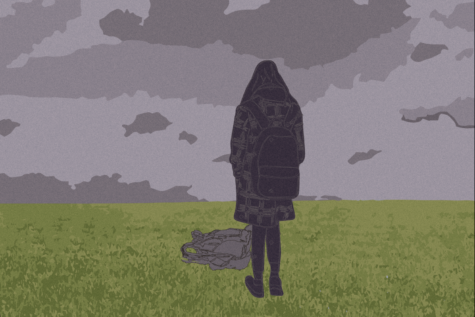OPINION | Starting a conversation, performative suicide awareness
November 16, 2022

Discussing mental health is extremely important. This includes allowing for an open dialogue surrounding suicide and options available for help. Tulane University has made resources like The Line and QPR training available to anyone with an @tulane.edu email address, providing mental health support and guidance on how to approach the topic of suicide.
As it becomes less taboo to talk about distressing, personal topics like suicide, it becomes more important to do so appropriately. These are serious topics, and they need to be addressed respectfully and healthily.
On Nov. 2, Tulane hosted an event called Send Silence Packing. Tulane paid an organization called Active Minds $6,000 to set up a display on the Berger Family Lawn in front of the Lavin-Bernick Center for University Life.
The exhibit consisted of about 1,000 backpacks laid out across the lawn and over 250 personal narratives regarding mental health and suicide. The goal of the event, according to Tulane Today, was to convey the message “you are not alone, help is available, and we each play a critical role in changing the culture around mental health.”
While the intent was good, the execution could have been better. The exhibit was deliberately impossible for students to avoid — it was set up on a central part of campus between student housing and the rest of the university buildings.
Students were only informed of the exhibit in general announcements: a “5 Things TU Know” newsletter and a Tulane Today email. Neither of these communications placed a primary focus on the event either; rather, it was the second and fifth announcements in these respective emails. The only university communication which focused exclusively on Send Silence Packing was an Instagram post by Tulane Campus Health, which was made ten minutes before the event began.
The event itself also did not foster healthy dialogue around suicide. Presenting personal narratives regarding suicide — including accounts of successful attempts — should not be done without some form of guidance. The Well of Health Promotion at Tulane provided professionals for students to talk to, but in the pursuit of starting a conversation, the university completely disregarded sensitivity.
Suicide is the third leading cause of death for 15- to 24-year-olds, and over 10% of college students reported that they had seriously considered suicide in the past year. In 2018, one in five college students reported feeling so stressed that they had considered taking their own lives.
As college students, it’s safe to assume that many Tulanians have had some personal experience with suicide, and by extension, safe to assume that these students would have appreciated a more direct warning.
But where everything above presumably happened with good intent, this exhibit included advertisements — something much harder to justify. Attending students were provided a small blue paper, courtesy of Active Minds, which had information for those visiting the display. This sheet included three pieces of advice to “change the culture around mental health.” The first was to encourage friends to seek help and seek help yourself if necessary. The second was to check in with loved ones, actively listening to them and asking questions when needed.
But the last piece of advice was to download an app called håp, created by a tech startup in San Francisco named Flourish Labs. Flourish Labs lists Active Minds as their co-design and outreach partner on their website. The app, according to the paper, collects a combination of mind and body data to help improve mental health and well-being. At the very bottom of the paper, taking up even less space than the links to Active Minds’ social media and the app they marketed, was the number for the national suicide prevention hotline.
This is inexcusable. Instead of taking an opportunity to generate healthy discussion of suicide and mental health, which would have combatted the taboo around mentioning these topics, the event organizers tried to convince students that downloading their app was an essential step to preserving or improving their mental health — suggesting that it is equally as important as seeking professional help and checking in on loved ones.
Beyond all of the other questions this event raised — why didn’t the university adequately warn students? Where does the $6,000 given to Active Minds go, given that they ask for the host to provide about 25 volunteers and mental health professionals? Where was the guidance for long-term discussion of suicide and mental health? Most importantly, why did anyone consider it appropriate to use this as an opportunity to advertise an app?
The first question can be attributed to human error and the second to general operating costs. The lack of explicit guidance could be explained by sensitivity — approaching someone with a sheet of questions regarding suicide may not be the most respectful way to start a conversation, in the same way that setting up an unavoidable exhibit about suicide and mental illness in the center of campus may be considered less than tactful.
But it is much harder to justify why this event was used to encourage students to download, of all things, an app created by a privately owned company. Active Minds did not provide any meaningful guidance to resources that students may need. Anyone can copy-paste the number for the national suicide prevention hotline — 988 — and anyone can encourage people to seek professional help. Failing to provide guidance on where and how to seek it, a responsibility thankfully taken up by Tulane’s Well for Health Promotion, raises questions about how concerned Active Minds really is.
Tulane Today was right when they said that we each play a critical role in changing the culture around mental health. The hard part about discussing suicide and mental health is not raising awareness but doing it in a healthy way.
Consider Netflix’s Thirteen Reasons Why, a show infamous for its unhealthy romanticization of suicide and mental illness. The show started countless conversations about suicide, mental health and seeking help; however, none of these conversations started because the show was good. These conversations started because of the impact the show could — and did — have on vulnerable people. There is nothing healthy or helpful about turning a suicide-awareness event into an advertisement.
For Tulane students in need of mental health support, contact Counseling and Psychological Services at 504-314-2277. The Counseling Center is open 8:30 a.m. to 5 p.m. Monday–Friday. The Counseling Center provides mental health counseling and other related services.
The New Orleans Alliance on Mental Illness Crisis Line can be reached 24/7 by texting “NAMI” to 741741.
Students in need of additional support can contact the Residential Advisor on call in their residence hall. Students may also call the on-call Case Manager at 504-920-9900.
For LGBTQ+ students, the Trevor Project provides crisis intervention and suicide prevention services to those under 25 and can be reached at 866-488-7386.
The Employee Assistance Program is available for faculty and staff seeking counseling or support. Information about Employee Assistance Programs can be found at https://hr.tulane.edu/benefits/employee-assistance-program.
The National Suicide Prevention Lifeline can be reached 24 hours a day at 800-273-8255.









Leave a Comment